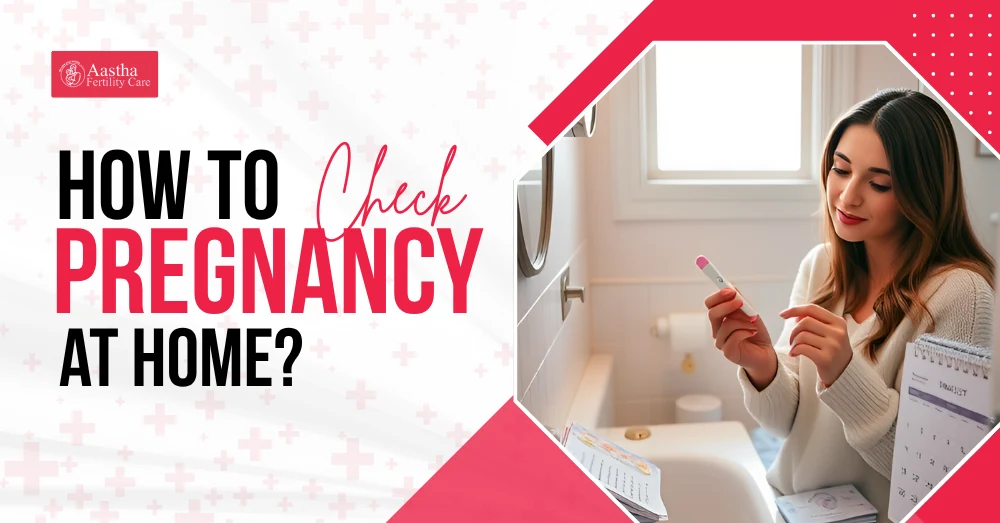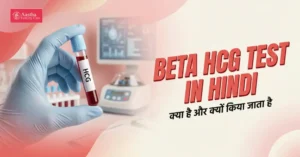Motherhood is one of the most exciting and beautiful moments of any female’s life. Many times, females wait for years after marriage to experience motherhood.
In this journey of motherhood, one of the most crucial factors is to identify whether you’re pregnant or not. Right after missing periods or experiencing any other common symptoms, females want to ensure if they are pregnant, whether they are planning for the baby, or want to take some time. In both of the cases, identifying pregnancy is necessary.
Dr. Namita Kotia, the fertility expert at Aastha Fertility Care, emphasizes that it’s necessary to consult with a specialist for accurate information.
However, many women often ask if it is possible to find out about pregnancy at home without consulting a doctor, or how to check pregnancy at home.
Well, the answer is ‘Yes’!
In this comprehensive guide, we’ll explore everything you need to know about checking pregnancy at home.

How to Use a Home Pregnancy Test Kit
The most convenient and go-to choice for checking pregnancy is the Home Pregnancy Test Kit. Home pregnancy test kits can easily be available at your nearby medical or pharmacy shop, proven to provide the most precise results among any other home pregnancy tests.
Home pregnancy test kits are based on a special hormone, HCG (Human Chorionic Gonadotropin). The hormone only develops in a woman’s body during pregnancy.
Let’s understand how you can use this kit to check pregnancy.
1. First of all, it’s necessary to choose the right time to check pregnancy. If you have missed your period, it is the best time to test.
Life Changing Experiences with Aastha Fertility - From Doubt to Success
2. As HCG is present in your urine and blood, you’ll have to collect the sample to check for pregnancy. You can use your morning urine as it contains a high amount of HCG, so the chances of getting precise results become stronger.
3. Each kit comes with some specific instructions; you should read and follow them. In general, you have two options: first is to urinate directly on the test stick, and the other is to collect urine and then dip the test strip.
4. After dipping the test strip, wait for 3-5 minutes. Most test results take time to showcase; therefore, watching too early or too late can lead to false interpretations.
5. If you are watching two pink lines on the strip or a plus sign, it means you are pregnant. On the other hand, negative results typically show one line or a minus sign.
Best Time To Test for Pregnancy
The other most asked questions by women when they check for pregnancy at home is, ‘Will I get an accurate result?’, ‘At what time shall I check the pregnancy?’
Aastha Fertility Care’s expert, Dr. Namita Kotia, emphasizes the importance of time to save you from false outcomes.
However, the most recommended time to check for pregnancy is right after missing the period, but checking so early might lead to false results. In home pregnancy test kits, you might get a positive result even after 10 days of conception.
Now, you have understood the best time to test for pregnancy, let’s talk about the best time of day. According to the doctors, first morning urine is ideal for more precise outcomes because it’s most concentrated in HCG.
It is important to note that if you take the test early, results might be false because during the early days, HCG levels are quite low, and the result may be varied from the actual situation.
What if you get a negative result but your period doesn’t arrive?

It is possible that you get a negative result even after a missed period. There are two scenarios, the first one is that you are not pregnant and your periods are missing due to some other hormonal issue.
Secondly, you should retest if you still have doubts. During early pregnancy days, HCG levels double every 48 to 72 hours, so doing a test later might detect what was missed earlier.
Factors Affecting Test Accuracy
Home pregnancy test kits are proven to give positive test results, but there are some factors that can influence the result’s accuracy.
1. Time is crucial:
Testing too early can cause false results. Since home pregnancy test kits detect HCG levels so your body needs time to produce enough hCG for detection. Even if you’re pregnant, testing too early might show negative results.
2. If the urine is diluted:
If you drink too much water, your urine can be diluted. Diluted urine has low levels of hCG concentration, causing false results. That’s why doctors recommend the first morning urine for precise results.
3. Expired Kits:
Expired test kits may not work properly, causing false results. Therefore, always check the expiry date before buying any home pregnancy test kit and store them in cool and dry places.
4. Certain Medical Conditions:
Certain medical conditions like ovarian cysts, kidney disease, ectopic pregnancy, or recent abortion can affect hCG levels, leading to false test results.
Types of Home Pregnancy Tests

Mainly, there are two types of pregnancy test kits: urine tests and blood tests. All pregnancy tests detect the hCG hormone, whether done with the help of pee or blood.
Home pregnancy test kits use pee to detect the hCG hormone, while healthcare specialists use blood to detect hCG and confirm pregnancy.
As compared to blood tests, home pregnancy test kits using urine are easy to use, inexpensive, and easily available in grocery or pharmacy stores.
However, all home pregnancy test kits use pee, but little did you know that these kits come in different varieties, too. You can choose the one based on your needs and preferences.
1. Digital Test:
The digital test kit displays clear ‘Pregnant’ or ‘Not Pregnant’ results, eliminating the lines. Some advanced digital tests also estimate the weeks of conception.
2. Traditional Line Tests:
Traditional line tests are the most common and affordable option. After peeing on the test strip or dipping it in pee, results appear as colored lines. Two pink lines indicate pregnancy, while one line means not pregnant. Sometimes the lines are faint, but they also indicate pregnancy.
3. Plus-Minus Tests:
A few home pregnancy test kits show results as a plus (+) sign or a minus (-) sign. The plus sign indicates pregnancy, while the negative sign represents not pregnant.
4. Midstream v/s Dip Tests:
In the midstream tests, you pee directly on the stick, while in the dip tests, you collect your pee in a cup and drip the test strip.
Natural Methods for Checking Pregnancy

Nowadays, technology has grown in many ways, and we have the flexibility to check for pregnancy in a few minutes. But in the past era, when there were no such resources, women used to follow some traditional methods to confirm pregnancy. However, these methods are not scientifically proven, but have been used historically by many women.
Let’s walk through some of the most popular natural methods for checking pregnancy.
1. The Salt Test:
Take some salt in a container. Pour your first morning urine into it and wait for 3-4 minutes. If the mixtures form creamy clumps or fizzes, it’s considered to be a positive sign. On the other hand, if there is no reaction, then you’re not pregnant.
2. The Sugar Test:
Take some sugar in a container and pour your first morning urine into it. If there is hCG hormone present in your urine, then it would make it difficult for sugar to dissolve, indicating pregnancy. If sugar dissolves easily, then you are not pregnant.
3. Toothpaste Test:
For the toothpaste test, you will require a plain white toothpaste without crystals and salt. Take 1 tablespoon of toothpaste in a container and pour around 1 spoonful of urine into it. You will have to combine the mixture slightly with the spoon and wait for a while. If the toothpaste becomes frothy and the color turns blue, it indicates pregnancy. On the other hand, if there is no change in the mixture, you’re not pregnant.
4. Wheat and Barley Test:
It’s an ancient Egyptian method to confirm pregnancy. You will require some wheat and barley grains for it. Take two containers and put both wheat and barley grains into it. In the morning, add your pee to each container and monitor for a few days.
If the grains sprout in either container, it’s a chance of pregnancy, and if the grains do not sprout, it means no pregnancy.
5. The Baking Soda Test:
Take a container and put 1 tablespoon of baking soda into it. Now add a small amount of your first morning urine and wait for 3-4 minutes. If your pee fizzes like soda, it indicates pregnancy, while if there is no reaction, it indicates no pregnancy.
Now you have understood how to check pregnancy at home, but it’s important to note that these natural methods are based on traditional beliefs rather than scientific evidence. Hence, you can’t rely on them fully.
Modern home pregnancy test kits are easy to use and provide accurate results, making them a reliable choice to confirm pregnancy. The key to successful pregnancy testing lies in proper timing, following the particular kit instructions, and understanding the factors that cause false interpretations.
Even after checking with a home pregnancy test, if you’re confused about your pregnancy, then you should consult a doctor to confirm and take further steps for care.
For more than 18 years, Aastha Fertility Care has been a partner for thousands of couples in their parenthood journey. Whether you’re concerned about your early pregnancy days or want to achieve parenthood successfully, consult our fertility specialists at Aastha Fertility Care and make your parenthood dream possible.

FAQs
How to check pregnancy at home?
Home pregnancy test kits are the best, offering 90% accuracy for the results, and are easily available too.
You can test as early as 10 days after conception, but for the most accurate results, wait until after your missed period. Early testing increases the chance of false negatives, even if you’re pregnant.
What if I get a faint line on the test?
A faint line usually indicates pregnancy, regardless of how light it appears. However, repeat the test in 2-3 days or consult a healthcare provider for confirmation with a blood test.
How can I check If I am pregnant without a pregnancy test?
You can monitor early pregnancy symptoms like missed periods, nausea, morning sickness, breast tenderness, fatigue, and frequent urination. You can also track your basal body temperature. If your body temperature is elevated above usual, it might indicate pregnancy. However, all these signs might vary in women; hence, consulting a doctor is a must to confirm pregnancy.







Leave a comment